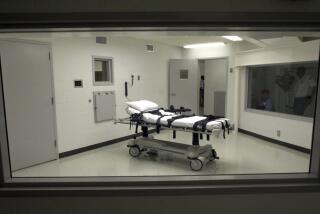Graves Recall Executed German POWs
- Share via
FT. LEAVENWORTH, Kan. — On a chilly hillside near a military prison, Wally Chilcoat places red silk flowers on 14 graves, those of the only German prisoners of war executed on American soil.
Now 69, Chilcoat has performed her ritual a few times each year since 1991, remembering POWs convicted of murdering fellow Germans considered traitors to the Nazi cause.
Chilcoat lived in Germany during World War II. Her father died in a prison camp in Russia, having been drafted into the German army after speaking out against the Nazi government. She doesn’t excuse the Nazi horrors, but she does believe the German POWs deserve to be remembered.
“These boys were just doing their job. I know we were enemies, but they were soldiers,” said Chilcoat, of Bean Lake, Mo. “They killed one of their own, a traitor.”
Apart from her visits, the POWs are largely forgotten, buried in the back of the cemetery for American soldiers who were executed, or who disgraced their uniform and died behind bars, and had no one to claim their remains.
All 14 German POWs had been court-martialed and found guilty of murder. On July 10, 1945, after Germany’s surrender, five were hanged in an old warehouse elevator shaft at the U.S. Disciplinary Barracks. They were convicted in Oklahoma for a murder at a POW camp there.
Within a week, two others were hanged in the same shaft. Seven others were executed on Aug. 25, after World War II had ended with Japan’s surrender.
Why were they executed? Perhaps due to the times as much as to their deeds.
“It was a bad time in 1945,” said Col. Karlheinz Ammann, the German Federal Armed Forces liaison at Ft. Leavenworth. “The Allies had found the concentration camps, and there was no desire to show mercy for the Nazis at that time. And that is understandable.”
The POWs “were educated in the Third Reich. They were convinced the guys they killed were traitors. They had no chance to learn differently,” said Ammann, one of several foreign military men working with U.S. officers at the Army’s Command and General Staff College here.
One executed soldier echoed that, across the decades.
“What I did was done as a German soldier under orders,” Rudolf Straub said just before his execution. “If I had not done so, I would have been punished when I returned to Germany.”
In 1944, Straub and another German soldier had beaten Horst Guenther to death at a POW camp in Aiken, S.C.
In another case, seven captured submariners beat, choked and hanged Werner Dreschler, an inmate who had given the Americans information about German U-boat tactics. They believed Dreschler’s action had caused the deaths of their comrades at sea.
The executions were delayed until Germany surrendered because the Nazis had threatened to execute American POWs in retaliation, said John Reichley, a historian at Ft. Leavenworth.
In 1944, President Roosevelt refused to commute the death sentences of the first five executed. President Truman followed suit after he took office in 1945--with one exception.
Truman spared Edgar Menschner, commuting his sentence to 20 years behind bars for the beating death of a fellow POW at Camp Chaffee, Ark. “It gave hope to the other 14,” Reichley said, “but not for long.”
The historian also noted some speculation that Truman saw rough times ahead with Soviet leader Josef Stalin. “I think he wanted to prove the point to Stalin that you don’t want to mess with the United States.”
Ammann cited several reasons to keep the graves at Leavenworth. “It’s not a bad place to stay, this little cemetery,” he said, noting a lack of burial space in Germany.
And Nazis remain outcasts in Germany, the party officially banned. But, he said, a right-wing minority still supports Nazi concepts, and any effort to repatriate POWs buried in the United States could make the situation worse.
“There are German graves all over Europe and no place to bring them back,” Ammann said. “Why would you bring them to Germany?”
More to Read
Sign up for Essential California
The most important California stories and recommendations in your inbox every morning.
You may occasionally receive promotional content from the Los Angeles Times.













